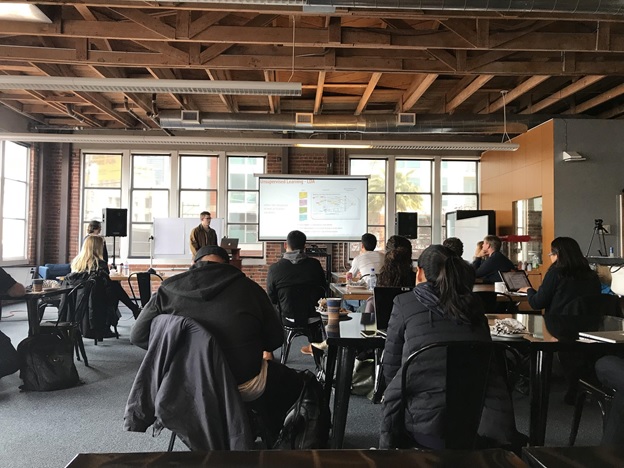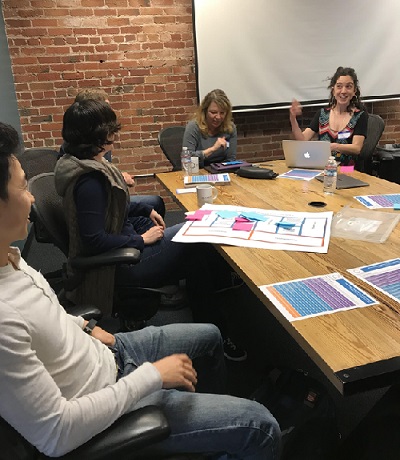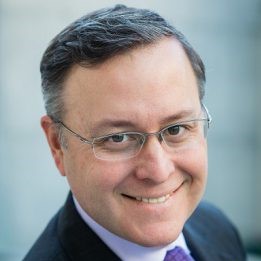Two people go searching for a partner online. They come across each other's profiles. Though they come from very different backgrounds, their profiles line up with shared interests and shared values. After some back and forth by email and instant message, they agree to meet at a Waffle House.
Who are they? One represents an NGO helping small farmers recover from a recent disaster. The other is a supply chain management executive for a multinational agribusiness company looking to rebuild their supply chain while opening up new markets and suppliers in the wake of the disaster.
Why did they meet at a Waffle House? Because they both know that Waffle Houses are used by the US Federal Emergency Management Agency (FEMA) as a proxy for tracking disasters. If the Waffle House is closed, things are really bad.
Where did they find each other? On the Shared Value Index — a new platform scoped out by a team of data scientists during "Open Data Day San Francisco: Using Open Data to Solve the SDGs". Organized by the Open Data Bay Area meetup and sponsored and hosted by Domino Data Lab, this mini-hackathon brought together data scientists, engineers and civil society pros to hack on using open data to tackle the UN Sustainable Development Goals (SDGs). The event was held in the spirit of the UN World Data Forum, which will convene its next session in Dubai in October 2018.

Independent Expert and Advisory Group
A 2014 report from the UN Secretary-General's Independent Expert and Advisory Group on a Data Revolution for Sustainable Development, entitled "A World That Counts", outlines a set of key recommendations for how to tap into the data revolution and advance the SDGs. Among its recommendations: convene the UN World Data Forum and build a platform of trust and confidence among key stakeholders and data users through shared principles and shared technology and innovations for the common good. The participants in this mini-hackathon convened in service of those very principles.
After hearing brief "lightning talks" from experts on different parts of the SDGs, participants received a crash course in the Domino Data Science for Social Good (DSSG) Marketplace, an open platform where they can share their ideas and data sets. They also got a crash course in the CollaborateUp Formula, a lean startup approach to social innovation and creating shared value. Participants brainstormed barriers to using open data for the SDGs that included disconnects among data collectors, data providers and data users, and data that doesn't tell the whole story. They then brainstormed issues they'd like to work on, ultimately deciding to pick one global issue and one hyper-local issue to hack on:
- Mapping and matchmaking for SDG-related partners
- Providing free Internet access for children outside of school in Oakland

CollaborateUp Formula Working group
Breaking into teams and using the CollaborateUp Formula, each team had an afternoon to scope their problem, identify data sets and develop a "pitch" to share with the group. The mapping and matchmaking group came up with the story that opened this blog and a set of six data axes that need mapping:
- SDGs: down to the sub-SDG
- Organizations: that have made public statements related to the SDGs
- Geography: where the work/commitment is occurring
- Time: when the work happened or will occur
- Access: similar to the Waffle House Index, develop an international proxy to indicate the ease of working in a given area
- Funding: where's the money committed and by whom?
- Rating of social impact: how effective has the work been?
The group working on free internet access in Oakland identified a potential partner NGO and data sets to determine areas with high need concentrations.
Both groups decided to create a space on the Domino DSSG Marketplace and continue hacking on these problems. They also identified several takeaways and suggestions for others interested in using open data for the SDGs:
- It's difficult to find open data.
- We have to be really careful about how we interpret the data. As an example, don't assume that kids live near the school they attend or that broadband availability equates to accessibility. Children in Oakland are often bussed to schools from far away, and while an internet service provider map might indicate availability in a given ZIP code, the families in that ZIP code may not be able to afford it.
- There are many people already working on related initiatives — hence the value of the SDG matchmaking idea.
- Data.gov created a markup that agencies could use to indicate that they were posting open data about the agency's work. This made it easier for others to scrape and aggregate that data. The UN or the Global Partnership for Sustainable Development Data could do something similar to make it easier for organizations to share their commitments and for others to find them.
How you can get involved
This is just a quick summary of the ideas that came out of the hackathon. We hope to share more details as they develop. If you have any suggestions, please share them in the comments or email us at info@collaboratup.com.
From this experience we can see how open data can accelerate the SDGs. Unfortunately, many of the data we need remain trapped. As individuals and organizations across the world redefine sustainability and begin purposeful projects to meet the SDGs, we urgently need to mobilize the data revolution through collaborative action. If you feel drawn to one of the projects scoped out during the Open Data SF hackathon, consider joining the Domino DSSG Marketplace to start hacking! As another option, iTech recently established its "SDGs data lab" to provide assistance in design, development and production of national SDG dashboards and reports. Either platform would provide a good starting place.
Finally, join us at the UN World Data Forum in Dubai, United Arab Emirates, on October 22-24, 2018, where we will continue to work together to accelerate our collective impact.
Richard Crespin is CEO of CollaborateUp, a consulting firm advising businesses and non-profits on how to work together to solve big problems. He is a member of the Programme Committee for the UN World Data Forum 2018.
